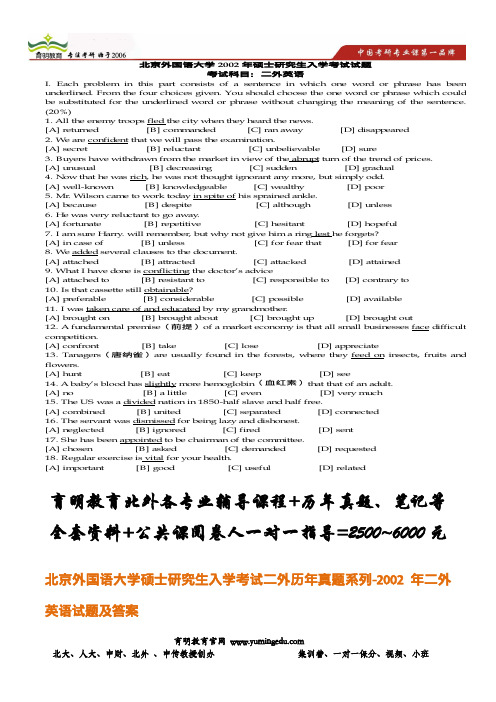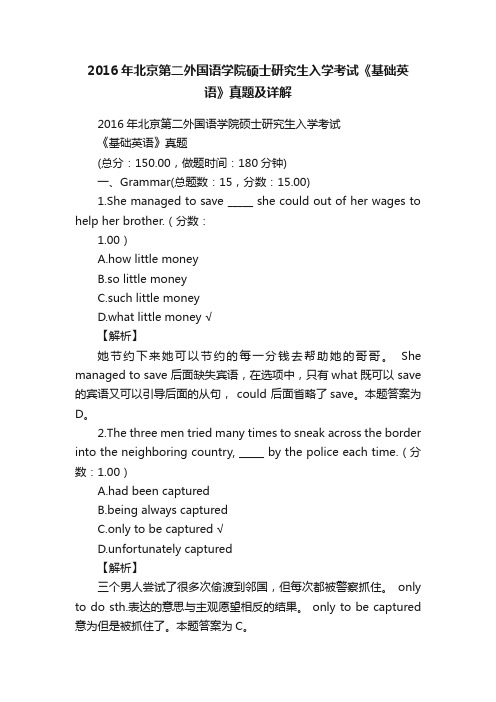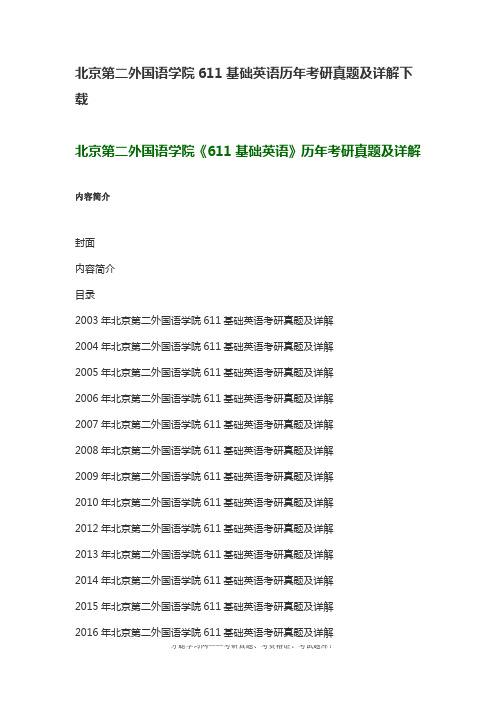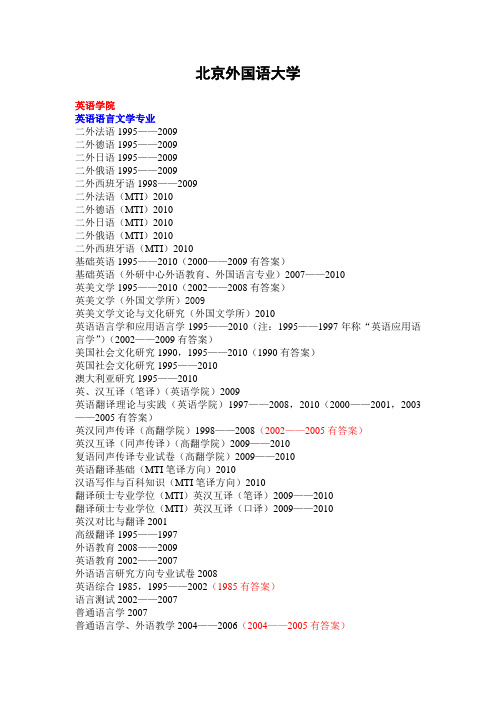北京外国语大学硕士研究生入学考试二外历年真题系列-1997年二外英语试题
北京外国语大学硕士研究生入学考试二外历年真题系列-2002年二外英语试题及答案

[C] of...speaks
[D] two... speak
10. That story about the haunted house is ______ long ______ tell.
[A] so ... to
[B] too.., for
[C] very ... for
[D] too ... to
[A] If she finished
[B] Having finished
[C] In order to finish
[D] When she finished
9. Neither _______ Joe’s parents _______ English.
[A] from... speaks
[B] one.., speak
competition.
[A] confront
[B] take
[C] lose
[D] appreciate
13. Tanagers(唐纳雀)are usually found in the forests, where they feed on insects, fruits and
flowers.
2. Although Bob is _____ age as Kathy, he isn’t _______ as she is.
[A] as same ... tall
[B] the same.., as tall
[C] same ... taller
[D] the same..., tall
3. Jennifer doesn’t smoke regularly, but she does have a cigarette______.
2016年北京第二外国语学院硕士研究生入学考试《基础英语》真题及详解

2016年北京第二外国语学院硕士研究生入学考试《基础英语》真题及详解2016年北京第二外国语学院硕士研究生入学考试《基础英语》真题(总分:150.00,做题时间:180分钟)一、Grammar(总题数:15,分数:15.00)1.She managed to save _____ she could out of her wages to help her brother.(分数:1.00)A.how little moneyB.so little moneyC.such little moneyD.what little money √【解析】她节约下来她可以节约的每一分钱去帮助她的哥哥。
She managed to save 后面缺失宾语,在选项中,只有what既可以 save 的宾语又可以引导后面的从句, could 后面省略了save。
本题答案为D。
2.The three men tried many times to sneak across the border into the neighboring country, _____ by the police each time.(分数:1.00)A.had been capturedB.being always capturedC.only to be captured √D.unfortunately captured【解析】三个男人尝试了很多次偷渡到邻国,但每次都被警察抓住。
only to do sth.表达的意思与主观愿望相反的结果。
only to be captured 意为但是被抓住了。
本题答案为C。
3.Acute hearing helps most animals sense the approach of thunderstorms long before people _____.(分数:1.00)A.do √B.hearC.do themD.hearing it【解析】灵敏的听觉使大多数动物在人类之前感受到暴风雨。
[考研类试卷]2012年北京第二外国语学院英语专业(英美文学)真题试卷.doc
![[考研类试卷]2012年北京第二外国语学院英语专业(英美文学)真题试卷.doc](https://img.taocdn.com/s3/m/d6f35bfb32d4b14e852458fb770bf78a65293af5.png)
[考研类试卷]2012年北京第二外国语学院英语专业(英美文学)真题试卷.doc[考研类试卷]2012年北京第二外国语学院英语专业(英美文学)真题试卷一、单项选择题1 In Benjamin Franklin's The Autobiography, 13 virtues are enlisted for seek of self-discipline, which show representatively ______.(A)the American value(B)spirit of democracy(C)ideal of equality(D)the great awakening2 Different from other writers of______, Edgar Allan Poe's works show reminiscence ofa genteel tradition.(A)the colonial time(B)American Romanticism(C)American Realism(D)American Naturalism3 The spirit of the Romantic Age of American literature is ______.(A)retrospect of American pastoral life(B)understanding and sympathy to the poor(C)affirmation of American identity(D)criticism of industrialization and urbanization4 Which of the following is NOT true about Emily Dickinson?(A)One of the major themes of her poetry is death.(B)Her use of dash and capitalized letters in poemsinfluences modern poetry deeply. (C)She is a radical fighter against patriarchal society.(D)Although there is a frequent use of first person narration in her poem, the "I" has a diversified connotation except a reference to the author.5 Edgar Allan Poe is not only a poet, but also the founding father of ______in American literature.(A)detective stories(B)psychological allegory(C)political comments(D)folklore6 Of the following writers, ______ is NOT a writer of Realism.(A)Mark Twain(B)William Dean Howells(C)Herman Melville(D)Henry James7 The most influential poets in early 20th century are ______.① Ezra Pound ②Robert Frost ③T.S. Eliot ④Longfellow(A)①②③④(B)②③④(C)①②③(D)①②④8 ______ period extended from the invasion of the Celtic England by German tribes in the first half of the 5 th century to the conquer of England in 1066 by the Norman French under the leadership of William the Conqueror.(A)The Anglo-Norman(B)The Middle English(C)The Chaucerian English(D)The Old English9 A group of tales in several languages concerning ______ and his knights developed into a literary tradition around a core of possible historical authenticity.(A)King Lear(B)King Arthur(C)King Solomon(D)King Henry III10 According to Paradise Lost, Adam and Eve are forbidden to eat the fruit of the Tree of Knowledge of______.(A)Wisdom and Ignorance(B)Love and Hatred(C)Faith and Betrayal(D)Good and Evil11 ______ has been considered the most famous British dramatist since Shakespeare, who advocates that artistic work should reflect the urgent social problem in the late 19th century.(A)Bernard Shaw(B)Henrik Johan Ibson(C)Jonathan Swift(D)Virginia Woolf12 There are two types of poetry: narrative poetry and ______ poetry according to their different stress on action or emotion.(A)epic(B)folkloric(C)lyric(D)romantic13 In ______, morality and common sense became the predominant preoccupation in literary works.(A)Victorian time(B)Elizabethan time(C)modern time(D)old English time14 "Ode to the West Wind" is the representative work of romantic poet______.(A)Milton(B)Shelly(C)Byron(D)Yeats15 The Hero in Romance is usually the(A)king(B)knight(C)Christ(D)churchman二、名词解释16 Byronic hero17 West humor18 Imagism三、分析题18 Read the following passage and answer the questions:This text below is taken from Alice Walker's short story " Everyday Use". Please answer the following questions according to the excerpt:Maggie will be nervous until after her sister goes: she will stand hopelessly in corners, homely and ashamed of the burn scars down her arms and legs, eying her sister with a mixture of envy and awe. * She thinks her sister has held life always in the palm of one hand, that " no" is a word the world never learned to say to her. *You've never doubt seen those TV shows where... mother and child embrace and smile into each other's faces... Sometimes Idream a dream in which Dee and I are suddenly brought together on a TV program of this sort...In real life I am a large, big-boned woman with rough, man-working hands. In the winter I wear flannel nightgowns to bed and overalls during the day. I can kill and clean a hog as mercilessly as a man. My fat keeps me hot in zero weather. I can work outside all day, breaking ice to get water for washing; I can eat pork liver cooked over the open fire minutes after it comes steaming from the hog. One winter I knocked a bull calf straight in the brain between the eyes with a sledge hammer and had the meat hung up to chill before nightfall. But of course all this does not show on television. I'm the way my daughter would want me to be: a hundred pounds lighter, my skin like an uncooked barley pancake. My hair glistens in the hot bright lights. Jonny Carson has much to do to keep up with my quick and witty tongue.I never had an education myself. After second grade the school was closed down. Don't ask me why; * in 1927 colored asked fewer questions than they do now. * Sometimes Maggie reads to me. She stumbles along good-naturedly but can't see well. ...She will marry John Thomas and then I'll be free to sit here and I guess just sing church songs to myself. Although I never was a good singer. Never could carry a tune. I was always better at a man's job.Notes:1. Maggie and Dee are the daughters of the narrator. "her sister" refers to Dee.2. Jonny Carson is a very popular TV host in 1960s in the States.19 Paraphrase the underlined sentence between the asterisks in Paragraph 1.(2 points)20 What kind of person is "I" according to the excerpt?(2 points)21 What writing skills are used to construct the narrator's image? What artistic effect does this kind of narration achieve?(4 points)22 Comment on the underlined sentence between the asterisks in the last paragraph and explain what social movement influenced the ethnic Americans when the story happened?(3 points)。
北京外国语大学硕士研究生入学考试基础英语2000[试卷+答案]
![北京外国语大学硕士研究生入学考试基础英语2000[试卷+答案]](https://img.taocdn.com/s3/m/1a8212277375a417866f8fba.png)
北京外国语大学2000年硕士研究生入学试题基础英语试卷I.Reading Comprehension.(32分)1.Read the following article and paraphrase the underlined parts:The twenty-first century will mark the era of tertiary and lifelong learning for everybody-or almost everybody.Thus the West Report from Australia,echoing a key theme of the immediately preceding Dearing Report in the UK①(National Committee of Inquiry into Higher Education [NCIHE],1997).The notion of lifelong learning has pervaded higher education around the world as governments have increasingly come to recognize a link between their education systems and national economic performance.However,policy relating to the actual making of the link needs deeper consideration.The development of key skills’has been seen in the UK as an important way in which higher education can contribute to economic development,but it can be argued that to focus on these skills represents a narrow and insufficient response to what employers-and the wider interest-really need(see Stephenson’s[1998]argument for a‘capability’approach to higher education and,more broadly,the discussion in part2of Barnett[1994].However the contested nature of this aspect of higher education might be resolved,current discussions have left relatively unexplored the broader implications for curricula②and,in particular,for fist-cycle provision.In earlier times many took the view that a first degree③was a sufficient basis for lifetime career.The accelerating pace of knowledge development has undermined this conception,and increasing attention is now being given to the provision of higher degree programs and other opportunities for professional development.This raises a serious question:what function does the first degree serve in the context of lifelong learning?Logically,it makes no sense in today’s world to try to pack first degree curricula with all the knowledge,understanding and skills need for the rest of a lifetime.There simply is not the time available,and anyway curriculum-packing runs the risk of superficiality of learning.④A first degree should,if they have not already acquired it,develop in students the ability to learn how to learn,as well as enhance their subject-specific expertise and other relevant skills.The old saying is valid here:giving individuals each a fish might feed them for a day,but teaching them the skills of fishing could feed them for life.There is a need to think of the first degree in terms of the quality,rater than the quantity,of students’learning,In today’s world the first degree becomes more of a foundation qualification, upon which graduates will expect to build during their lives.Some might react by saying that to make such a shift implies a dilution of academic standards-but the counter is that standards relate primarily to the quality,and not the quantity,of students’learning.⑤The reconstrued first degree need be no intellectual poor relation:academic rigour can be built into curricula of widely differing focus.The standards may well be different,but they do have to be inferior.Some reduction in the volume of discipline-specific content will require an adjustment of thought⑥-in particular,on the part of employers and professional bodies.The professional accreditation of some first degree programs is seen by some as an essential condition.However, there seems no necessary reason for this to be the case-and it might well be to the professions’longer-term advantage if first degree curricula were to pay particular attention to developing in graduates the ability to learn to learn,⑦leaving subsequent professional and developmentalactivities to provide the‘topping-up’that would cohere with the professional bodies’expectations.A strategic vision for higher education in the next millennium requires more than a muttering of the mantra of lifelong learning.Making lifelong learning‘work demands a sustained commitment to fitting together the pieces of the multidimensional jigsaw whose components include educational purposes,values and practicalities.Academics are among the people who ought to relish this jigsaw’s challenge.Whippier-snapper:an insignificant,esp.young,person who appears impertinent.①echoing a key theme of the immediately preceding Dearing Report in the UK.②However the contested nature of this aspect of higher education might be resolved,current discussions have left relatively unexplored the broader implications for curricula.③first degree④curriculum-packing runs the risk of superficiality of learning.⑤but the counter is that standards relate primarily to the quality,and not the quantity,of students’learning.⑥Some reduction in the volume of discipline-specific content will require an adjustment of thought⑦it might well be to the professions’longer-term advantage if first degree curricula were to pay particular attention to developing in graduates the ability to learn.Ⅱ.Read the following passage and answer the following questions:(28分)When that Grand old Man of Victorian,William Evart Gladstone,was in his85th year,he was steering the second home-rule bill foe Ireland through a recalcitrant parliament and going home to translate the odes of Horace at night,When Ronald Reagan reached the tender age of73,he was fighting his second presidential election campaign.Alan Greenspan,the world’s most successful central banker,is also73.Politics and economics are plainly jobs that the old can do well.They are not alone.The boardrooms of the world’s big companies are full of non-executive sages, telling whippersnapper40-somethings how to run their firms.①Why,then,are so few of the rich world’s older folk in employment?They live longer and enjoy better health than their parents did.Most jobs have become less physically demanding;most people in late middle age are well sensibly,is no harder than training the young.But the figures show an1960,men could expect to spend50of their68years of life in paid work.Today,they are likely to work for only38of their76years.Fewer than two-thirds of men in their late50a and early60s ate in the rich world’s labour force.by the time they celebrate their55th birthday,more than half of Europe’s men have gone home to translate Horace.②For most,that is something to celebrate.Never before have so many people been able to look forward to so many years of healthy leisure.Two-thirds of people say that they like being retired and have no desire to go back to work There are grandchildren to enjoy,foreign countries to visit,books to read and golf games to play.The pleasures of old age less expensive,and more widely available,than ever before.③Silver-haired liningThe big question is whether all of this retirement is voluntary.It is worth asking for its own sake;in a liberal society,the old,too,should be free to choose.But,in addition,the stampede to retire has consequences not merely for the old themselves.And it is often being encouraged by perverse public policy.Widespread and early retirement will increasingly affect the lives of everyone else,for two reasons.The first is a familiar one:as the share of old folk in the population rises,so will the burden on the young of paying for their pensions and health care.The second is less discussed:the rise of the grey-headed leisured class has consequences for economic growth,because of its impact on the supply of labour and of capital.Many governments,their eyes focused on the impact that future pensions claims will have on public finances,have embarked on reforms__but not always reforms that five pensioners a freer choice.For their eyes are also trained.in the shorter term,on high unemployment.④Governments,especially in western Europe,are pressing more people to retire early,on the mistaken view that this will provide jobs for the young,even as they try to trim pensioners’entitlements in order to reduce the burden on public finances.This is unforgivable from a liberal point of view.It is also foolish from the perspective of public policy.The sheer size of the baby-boom generation that starts to teach retirement age over the coming decade means that there will be a simple,but huge imbalance:too few people in work, paying taxes and pension contributions;too many in retirement,drawing on pensions and running up health costs.In that case,the main alternatives will be to renege on the pensions that workers thought they had been promised,or to raise taxes.It would be far better for the health of economies if more older people went on working instead.Quite small rises in the ages at which people retire have large effects.⑤As long as older folk stay in the job market,they pay taxes (helping one side of the fiscal balance)and draw either no pension,or a smaller one(helping the other).Governments should recognize that people(like politicians)would prefer to decide for themselves when to retire.At Present,the choice is,perversely,biased in favour of retirement.For example,in many countries,the opportunity cost of working beyond the minimum retirement age is high:workers must often leave the job market in order to receive a state pension,and even where this is not the case,they rarely earn any extra pension for their additional taxes and contributions,If they claim disability benefit,as many in their late50s and early60s do,their pension rights are rarely affected.Such perverse incentives should be replaced with neutrality.Employers,often urged on by trade unions,also put obstacles of their own in the way of older workers.Pension schemes based on defined benefits make it disproportionately expensive to offer jobs to older people.Pay schemes that reward longs service more that merit and productivity make it disproportionately costly to keep older workers on the payroll.⑥And sheer discrimination,formally banned in the united States but flourishing in most countries,persuades many older folk to go home rather than risk probable rebuff.Would such changes coax60-olds off the golf course?In America,where jobs for older workers are plentiful and the government is scrapping the tax disincentives for older folk to work, early retirement has begun to fall.Give people a choice,and they might surprise you.Answer the following questions.1.The boardrooms of the world’s big companies are full of non-executive sages,telling whippersnapper40-somethings how to run their firms.(1)what is the meaning of“boardroom”in this sentence?(2)what is meant by“non-executive sages”?(3)what is meant by“whippier-snapper40something’s”?2.By the time they celebrate their55th birthday,more than half of Europe’s men have gonehome to translate Horace.Do they really go home to translate poetry?What do they do?3.The pleasures of old age are less expensive,and more widely available,than ever before.Explain the idea of this sentence in your own words.4.For their eyes are also trained in the shorter term,on high unemployment.What is the meaning of this sentence?Explain in your own words.5.Quite small rises in the ages at which people retire have large effects.Explain in your own words.6.Pay schemes that reward long service more than merit and productivity make it disproportionately costly to keep older workers on the payroll.(1)why is it very costly to keep older workers on the payroll?(2)what is meant by“to keep…..on the payroll”?7.Does the author of this article advocate that workers reaching retirement age should stay on their jobs?If so,why?If not,what does he advocate?Ⅲ.Translate the following Chinese passage into English(40分)从诞生的那天起,人类就开始一刻也不停地创造着他的文明。
外国语学院二外德语历年考研真题及详解【可修改文字】

可编辑修改精选全文完整版外国语学院二外德语历年考研真题及详解(总5页)--本页仅作为文档封面,使用时请直接删除即可--全国名校外国语学院二外德语历年考研真题及详解(第3版)益星学习网可免费下载题库目录第1章全国名校外语学院二外德语考研真题分析二外德语考研真题分析重点院校二外德语考研真题比较第2章全国名校外语学院二外德语考研真题详解1.北京外国语大学二外德语考研真题及参考答案(2012~2014)2.中国人民大学二外德语考研真题及参考答案(2007)3.对外经济贸易大学二外德语考研真题及参考答案(2013~2014)4.北京第二外国语学院二外德语考研真题及参考答案(2012~2013)5.北京航空航天大学二外德语考研真题及参考答案(2012~2014)6.上海外国语大学二外德语考研真题及参考答案(2006)7.浙江大学二外德语考研真题及参考答案(2008-2009)8.武汉大学二外德语考研真题及参考答案(2008-2011)9.南京大学二外德语考研真题及参考答案(2008-2009)10.中山大学二外德语考研真题及参考答案(2012~2014)11.厦门大学二外德语考研真题及参考答案(2011~2013)12.四川外语学院二外德语考研真题及参考答案(2008-2009)13.南开大学二外德语考研真题及参考答案(2011~2012)第1章全国名校外语学院二外德语考研真题分析“二外德语”是全国各院校英语、日语、法语、俄语等外国语专业研究生入学考试科目,考生第二外语为德语。
一般来说,“二外德语”总分为100分,考试时间为3小时。
二外德语考研真题分析“二外德语”为全国各大院校自主命题,而非全国统考,没有统一的考试大纲,考生在备考“二外德语”时往往目标不明确,定位不准确,所以对各大院校的二外德语历年真题分析则显得尤为重要。
分析各大院校的二外德语试题能够为考生准确定位自己的德语水平提供很好的参照,也使考生对“二外德语”考试有一个全面的了解,更加清晰的了解出题者的思路,从而正确地制定出复习方法和学习步骤,使复习具有针对性,使复习的效果更上一层楼。
北京第二外国语学院611基础英语历年考研真题及详解下载

北京第二外国语学院611基础英语历年考研真题及详解下载北京第二外国语学院《611基础英语》历年考研真题及详解内容简介封面内容简介目录2003年北京第二外国语学院611基础英语考研真题及详解2004年北京第二外国语学院611基础英语考研真题及详解2005年北京第二外国语学院611基础英语考研真题及详解2006年北京第二外国语学院611基础英语考研真题及详解2007年北京第二外国语学院611基础英语考研真题及详解2008年北京第二外国语学院611基础英语考研真题及详解2009年北京第二外国语学院611基础英语考研真题及详解2010年北京第二外国语学院611基础英语考研真题及详解2012年北京第二外国语学院611基础英语考研真题及详解2013年北京第二外国语学院611基础英语考研真题及详解2014年北京第二外国语学院611基础英语考研真题及详解2015年北京第二外国语学院611基础英语考研真题及详解2016年北京第二外国语学院611基础英语考研真题及详解2017年北京第二外国语学院611基础英语考研真题及详解本资料收集了北京第二外国语学院“基础英语”2003~2017年(2011年除外)的考研真题,且所有真题均提供详细的参考答案及解析。
说明:本书精心搜集了市面上的历年真题,并整理了答案详解,备考价值尤为珍贵!若需要纸质内容,可以申请定制,详情咨询在线客服!•试看部分内容2003年北京第二外国语学院611基础英语考研真题及详解Ⅰ. GRAMMAR (20 points, 1 point each)Di re c ti o n s: In t h i s se cti o n, th e re a re20se n te n ce s e ach wi th o ne wo rd o r ph rase mi ssi n g. Ch oo se one o f the four choice s marke d A, B, C, and D th at be st comple te s th e se n te n ce. Th e n m ark th e co rre spo n di ng l e tte ron the ANSWER SHEET by blackening it.1. Th e re are m an y val u abl e se rvi ce s wh i ch th e p u b l i c are willing to p ay for, bu t which _____ bring a retu rn in money to the community.A. does noB. did notC. could notD. do not【答案】D查看答案【解析】句意:有很多公众可以出钱的有价值的服务,但是哪些会为社会回馈利益呢?很多中并不一定只有一个服务项目可赚钱回馈,所以应该用复数。
北京外国语大学(已有10试题)

北京外国语大学英语学院英语语言文学专业二外法语1995——2009二外德语1995——2009二外日语1995——2009二外俄语1995——2009二外西班牙语1998——2009二外法语(MTI)2010二外德语(MTI)2010二外日语(MTI)2010二外俄语(MTI)2010二外西班牙语(MTI)2010基础英语1995——2010(2000——2009有答案)基础英语(外研中心外语教育、外国语言专业)2007——2010英美文学1995——2010(2002——2008有答案)英美文学(外国文学所)2009英美文学文论与文化研究(外国文学所)2010英语语言学和应用语言学1995——2010(注:1995——1997年称“英语应用语言学”)(2002——2009有答案)美国社会文化研究1990,1995——2010(1990有答案)英国社会文化研究1995——2010澳大利亚研究1995——2010英、汉互译(笔译)(英语学院)2009英语翻译理论与实践(英语学院)1997——2008,2010(2000——2001,2003——2005有答案)英汉同声传译(高翻学院)1998——2008(2002——2005有答案)英汉互译(同声传译)(高翻学院)2009——2010复语同声传译专业试卷(高翻学院)2009——2010英语翻译基础(MTI笔译方向)2010汉语写作与百科知识(MTI笔译方向)2010翻译硕士专业学位(MTI)英汉互译(笔译)2009——2010翻译硕士专业学位(MTI)英汉互译(口译)2009——2010英汉对比与翻译2001高级翻译1995——1997外语教育2008——2009英语教育2002——2007外语语言研究方向专业试卷2008英语综合1985,1995——2002(1985有答案)语言测试2002——2007普通语言学2007普通语言学、外语教学2004——2006(2004——2005有答案)普通语言学及应用语言学(外研中心)2010句法、第二语言习得2003综合考试(含国际政治、汉语)2000——2002英语新闻业务与新闻学基础知识2006——2009国际新闻2010国际法学专业(无此试卷)外交学专业综合考试(含国际政治、汉语)2000——2002中国外语教育研究中心外国语语言学及应用语言学专业二外法语1995——2009二外德语1995——2009二外日语1995——2009二外俄语1995——2009二外西班牙语1998——2009二外法语(MTI)2010二外德语(MTI)2010二外日语(MTI)2010二外俄语(MTI)2010二外西班牙语(MTI)2010基础英语1995——2010(2000——2009有答案)基础英语(外研中心外语教育、外国语言专业)2007——2010英美文学1995——2010(2002——2008有答案)英美文学(外国文学所)2009英美文学文论与文化研究(外国文学所)2010英语语言学和应用语言学1995——2010(注:1995——1997年称“英语应用语言学”)(2002——2009有答案)美国社会文化研究1990,1995——2010(1990有答案)英国社会文化研究1995——2010澳大利亚研究1995——2010英、汉互译(笔译)(英语学院)2009英语翻译理论与实践(英语学院)1997——2008,2010(2000——2001,2003——2005有答案)英汉同声传译(高翻学院)1998——2008(2002——2005有答案)英汉互译(同声传译)(高翻学院)2009——2010复语同声传译专业试卷(高翻学院)2009——2010英语翻译基础(MTI笔译方向)2010汉语写作与百科知识(MTI笔译方向)2010翻译硕士专业学位(MTI)英汉互译(笔译)2009——2010翻译硕士专业学位(MTI)英汉互译(口译)2009——2010英汉对比与翻译2001高级翻译1995——1997外语教育2008——2009英语教育2002——2007外语语言研究方向专业试卷2008英语综合1985,1995——2002(1985有答案)文化语言学2007语言测试2002——2007普通语言学2007普通语言学、外语教学2004——2006(2004——2005有答案)普通语言学及应用语言学(外研中心)2010句法、第二语言习得2003综合考试(含国际政治、汉语)2000——2002外国文学所英语语言文学专业二外法语1995——2009二外德语1995——2009二外日语1995——2009二外俄语1995——2009二外西班牙语1998——2009二外法语(MTI)2010二外德语(MTI)2010二外日语(MTI)2010二外俄语(MTI)2010二外西班牙语(MTI)2010基础英语1995——2010(2000——2009有答案)基础英语(外研中心外语教育、外国语言专业)2007——2010英美文学1995——2010(2002——2008有答案)英美文学(外国文学所)2009英美文学文论与文化研究(外国文学所)2010英语语言学和应用语言学1995——2010(注:1995——1997年称“英语应用语言学”)(2002——2009有答案)美国社会文化研究1990,1995——2010(1990有答案)英国社会文化研究1995——2010澳大利亚研究1995——2010英、汉互译(笔译)(英语学院)2009英语翻译理论与实践(英语学院)1997——2008,2010(2000——2001,2003——2005有答案)英汉同声传译(高翻学院)1998——2008(2002——2005有答案)英汉互译(同声传译)(高翻学院)2009——2010复语同声传译专业试卷(高翻学院)2009——2010英语翻译基础(MTI笔译方向)2010汉语写作与百科知识(MTI笔译方向)2010翻译硕士专业学位(MTI)英汉互译(笔译)2009——2010翻译硕士专业学位(MTI)英汉互译(口译)2009——2010英汉对比与翻译2001高级翻译1995——1997外语教育2008——2009英语教育2002——2007外语语言研究方向专业试卷2008英语综合1985,1995——2002(1985有答案)语言测试2002——2007普通语言学2007普通语言学、外语教学2004——2006(2004——2005有答案)普通语言学及应用语言学(外研中心)2010句法、第二语言习得2003综合考试(含国际政治、汉语)2000——2002德语语言文学专业二外英语1997——2003(2000——2003有答案)德国外交经济2000——2005德国文学2001——2005德语翻译理论与实践2000——2005基础德语2000——2005德语教学法2004——2005德语跨文化经济交际2000——2005德语语言学2000——2005国际问题研究所外交学专业综合考试(含国际政治、汉语)2000——2002社会科学部外交学专业综合考试(含国际政治、汉语)2000——2002国际商学院外交学专业综合考试(含国际政治、汉语)2000——2002俄语学院俄语语言文学专业二外英语1997——2003(2000——2003有答案)俄罗斯社会与文化2002——2003,2005俄罗斯文学2002——2005俄语翻译2004俄语翻译技巧2002翻译理论(俄语专业)2003俄语翻译理论与实践2005俄语基础2004——2005俄语语言学基础理论2002——2004现代俄语语言学2005俄语综合2002法语系法语语言文学专业二外英语1997——2003(2000——2003有答案)欧洲语言学专业二外英语1997——2003(2000——2003有答案)德语系德语语言文学专业二外英语1997——2003(2000——2003有答案)德国外交经济2000——2005德国文学2001——2005德语翻译理论与实践2000——2005基础德语2000——2005德语教学法2004——2005德语跨文化经济交际2000——2005德语语言学2000——2005日语系日语语言文学专业二外英语1997——2003(2000——2003有答案)日本社会文化2004(日语系)日本语言文学2004(日语系)以下试卷为日研中心试卷,仅供参考:专业日语2009(2009有答案)基础日语1997——2006,2008——2009(2000——2006,2008——2009有答案)日本概况2003——2005(2003——2005有答案)日本社会1997——2004(2000——2004有答案)日本社会经济2008(2008有答案)日本社会日本经济2005——2006(2005——2006有答案)日本文化1997——2004,2008(2000——2004,2008有答案)日本文学1997——2004,2008(2000——2004,2008有答案)日本文学日本文化2005——2006(2005——2006有答案)日本语言1997——2004(2000——2004有答案)日本语教育2008(2008答案)日本语言日本教育2005——2006(2005——2006有答案)日本语学2008(2008有答案)综合考试(日语专业)1997——2002(2000——2002有答案)日研中心日语语言文学专业二外英语1997——2003(2000——2003有答案)专业日语2009(2009有答案)基础日语1997——2006,2008——2009(2000——2006,2008——2009有答案)日本概况2003——2005(2003——2005有答案)日本社会1997——2004(2000——2004有答案)日本社会经济2008(2008有答案)日本社会日本经济2005——2006(2005——2006有答案)日本文化1997——2004,2008(2000——2004,2008有答案)日本文学1997——2004,2008(2000——2004,2008有答案)日本文学日本文化2005——2006(2005——2006有答案)日本语言1997——2004(2000——2004有答案)日本语教育2008(2008答案)日本语言日本教育2005——2006(2005——2006有答案)日本语学2008(2008有答案)综合考试(日语专业)1997——2002(2000——2002有答案)西葡系西班牙语语言文学专业二外英语1997——2003(2000——2003有答案)西班牙语基础2003——2004(其中2004年的试卷共12页,缺P11-12)西班牙语专业2003——2004欧洲语言学专业二外英语1997——2003(2000——2003有答案)阿语系阿拉伯语语言文学专业二外英语1997——2003(2000——2003有答案)欧洲语系欧洲语言文学专业二外英语1997——2003(2000——2003有答案)亚非语系亚非语言文学专业(无此试卷)国际交流学院语言学及应用语言学专业比较文学概论2004海外汉学2003——2004现代汉语1999古代汉语1999综合考试(含国际政治、汉语)2000——2002综合考试(含古代汉语、古代文学、现当代文学)2001中国历史文化2001历史文化综合1999——2000语言学与应用语言学专业综合2000语言学及现代汉语2000——2001比较文学与世界文学专业比较文学概论2004海外汉学2003——2004中国古代文学专业综合考试(含古代汉语、古代文学、现当代文学)2001高翻学院外国语语言学及应用语言学专业二外法语1995——2009二外德语1995——2009二外日语1995——2009二外俄语1995——2009二外西班牙语1998——2009二外法语(MTI)2010二外德语(MTI)2010二外日语(MTI)2010二外俄语(MTI)2010二外西班牙语(MTI)2010基础英语1995——2010(2000——2009有答案)基础英语(外研中心外语教育、外国语言专业)2007——2010英汉互译(同声传译)(高翻学院)2009——2010英汉同声传译(高翻学院)1998——2008(2002——2005有答案)英、汉互译(笔译)(英语学院)2009英语翻译理论与实践(英语学院)1997——2008,2010(2000——2001,2003——2005有答案)复语同声传译专业试卷(高翻学院)2009——2010英语翻译基础(MTI笔译方向)2010汉语写作与百科知识(MTI笔译方向)2010翻译硕士专业学位(MTI)英汉互译(笔译)2009——2010翻译硕士专业学位(MTI)英汉互译(口译)2009——2010英汉对比与翻译2001高级翻译1995——1997外语教育2008——2009英语教育2002——2007外语语言研究方向专业试卷2008英语综合1985,1995——2002(1985有答案)语言测试2002——2007普通语言学2007普通语言学、外语教学2004——2006(2004——2005有答案)普通语言学及应用语言学(外研中心)2010句法、第二语言习得2003综合考试(含国际政治、汉语)2000——2002英语语言学和应用语言学1995——2010(注:1995——1997年称“英语应用语言学”)(2002——2009有答案)。
2018年北京第二外国语学院基础英语考研真题答案硕士研究生入学考试试题答案

II. Reading Comprehension (15 points / 1 point each)
1.C 2. A 3.A 4.C 5. D 6. C 7. D 8.C 9.C 10. C 11. B 12. A 13.D 14.B 15. C
机密★启用前
北京第二外国语学院
2018 年硕士研究生入学考试参考答案
考试科目:611 基础英语满分:150 分 考试说明:(1)请将答案写在指定答题纸上,若答在试卷上,则该科成绩无效;
(2)请将大题号、小题号分别标识清楚; (3)每大题之间务请留出明显的空白行。
I. Vocabulary & Grammar (15 points / 1 point each)
III. Translation (60 points / 30 points each) Section A(30 points)
当你接触到一本好书的时候,你应该问一问自己,“我是不是愿意像澳大利 亚的矿工一样干活?我的丁字镐和铲子是不是完好无损的,我自己的身体行不 行,我的袖子卷上去了没有,我的呼吸正常吗,我的脾气好不好?”而且呢,这 种干活的架势要坚持得时间长一些,即使令你感到神疲力倦,因为它是十分有用 的,而你所探寻的真金便是作者的心灵或意思,他的文字就像岩石那样,你非得 碾碎熔炼,才能有所收获。你的丁字镐就是你自己的心血、机智、学问;你的熔 炉就是你自己会思考的灵魂。切莫指望不用那些工具和那份磨练就能把握任何优 秀作者的意思;往往你需要最猛烈、最精心的打凿,最耐心的熔化,然后才能够 拾起一点真金。
- 1、下载文档前请自行甄别文档内容的完整性,平台不提供额外的编辑、内容补充、找答案等附加服务。
- 2、"仅部分预览"的文档,不可在线预览部分如存在完整性等问题,可反馈申请退款(可完整预览的文档不适用该条件!)。
- 3、如文档侵犯您的权益,请联系客服反馈,我们会尽快为您处理(人工客服工作时间:9:00-18:30)。
育明教育官网 北大、人大、中财、北外 、中传教授创办 集训营、一对一保分、视频、小班
育明教育北外各专业辅导课程+历年真题、笔记等 全套资料+公共课阅卷人一对一指导=2500~6000 元
北京外国语大学硕士研究生入学考试二外历年真题系列-1997 年二外 英语试题
育明教育官网 北大、人大、中财、北外 、中传教授创办 集训营、一对一保分、视频、小班
育明教育官网 北大、人大、中财、北外 、中传教授创办 集训营、一对一保分、视频、小班
育明教育官网 北大、人大、中财、北外 、中传教授创办 集训营、一对一保分、视频、小班
复试 调剂 阶段 录取 报到 阶段 2014 年 9 月 报到 2014 年 6 月-7 月 关注录取通知书 2014 年 2 月-5 月 查询成绩、关注复习情况,参加育明教育考研复试辅导班,联系导师。
育明教育官网 北大、人大、中财、北外 、中传教授创办 集训营、一对一保分、视频、小班
育明教育官网 北大、人大、中财、北外 、中传教授创办 集训营、一对一保分、视频、小班
育明教育官网 北大、人大、中财、北外 、中传教授创办 集训营、一对一保分、视频、小班
育明教育官网 北大、人大、中财、北外 、中传教授创办 集训营、一对一保分、视频、小班
育明教育官网 北大、人大、中财、北外 、中传教授创办 集训营、一对一保分、视频、小班
育明教育官网 北大、人大、中财、北外 、中传教授创办 集训营、一对一保分、视频、小班
育明教育课程:2013 年考研专业课视频 授课内容: 1.明确考试重点,建 立学科框架 2.考试参考书框架性 预热 阶段 记忆 2013 年 7 月-8 月 育明教育课程:专业 课基础班 授课内容: 1.明确专业课具体的 最新变化考点,落实 原考点 2.掌握背诵方法,开 始记忆 制定一个全面复习计划,开始第二轮复习。开始重点复习政治,重点进行英语真 2013 年 8 月-10 月 题的分析和政治基础的强化。此外,掌握专业课复习重点和复习方法。专业课复 习得进度一般为每天 50 页以上。采用“车轮复习法”。 育明教育课程:强化 发力 班 阶段 授课内容: 2.政治,背诵重要原理,理解知识点。育明教育咨询师认为,政治需要强化记忆 夯实必考点,进一步 的考点只有三个地方:“矛盾论”“认识论”“科学发展观和和谐社会”其他的 筛选重要的考点 知识点只需要理解和熟悉就可以,这样足够达到 70 分以上。如果技巧掌握的好, 1.专业课明确辅导老师总结的要点并记忆。 具体来说: 全面关注考研公共课的考试大纲,购买最新的辅导用书,准备暑期复习。同时, 重视英语单词的记忆和真题的分析。英语复习要运用“真题复习法”。 具体来说: 开始复习政治,通过育明教育政治辅导班或者一对一,对考研政治有一个大体的 了解。 做考研英语真题,从 2001 年开始。逐步掌握做题方法,了解出题规律。 专业课,掌握参考书的重要章节的框架。 具体来说: 英语单词要过三遍左右,以单词为主。专业课书起码把最重要的几本书看一遍。 在育明教育咨询师和辅导老师的帮助下,建立学科框架,了解考试重点。
Байду номын сангаас
育明教育官网 北大、人大、中财、北外 、中传教授创办 集训营、一对一保分、视频、小班
育明教育·2014 年考研复习宏观规划·仅供参考
复习 时间 进度 内容
育明教育官网 北大、人大、中财、北外 、中传教授创办 集训营、一对一保分、视频、小班
育明教育官网 北大、人大、中财、北外 、中传教授创办 集训营、一对一保分、视频、小班
有可能冲刺 80 分。 后期育明教育有历年公共课阅卷老师,可以给大家进行一对一的点评和分析。如 果有需要的话可以电话 400-6998-626 进行预约。 3.英语,继续真题的分析,同时可以保持朗读记忆真题中的文章,这也是培养对考 研英语语感的重要方法。 关注各招生单位的招生简章和专业计划,核对专业辅导用书,获取专业课考试信 2013 年 8-9 月 息。(育明教育提供相关参考) 1.确定十一黄金周复习计划,对前两个阶段的复习进行总结、梳理、查缺补漏。 同时,进一步加强专业课的复习。 2013 年 10 月 2.研究生报名:9 月底应届生预报名,10 月全体考生报名,谨慎填报,牢记报名 信息。 2013 年 11 月前后 研究生考试报名工作确认开始,考生到指定的地点进行现场确认,缴费并照相。 第三轮复习:政治、专业课的进入冲刺复习。 2013 年 11 月-12 月初 具体来说: 育明教育课程:冲刺 专业课重要考点必须全部记住并理解,并开始模拟考试。 班 政治所有知识点必须记住,并开始分析真题 授课内容: 英语,单词熟练掌握,每一道真题分析清楚,每一篇文章没有不认识的单词,不 加强记忆 理解的句子,不明白的段落。英语作文,通过育明教育咨询师(考研英语阅卷老 练习答题方法 冲刺 阶段 师)的讲解,争取达到 25 分以上(两篇作文总分 30 分)。 进行模拟实训,查缺补漏,联系答题方法和应试心态,做考前整理。这个时期, 专业课尤其需要模拟,往年考生在这个地方存在误区。 具体来说: 2013 年 12 月-2014 1.11 月末 12 月初,模拟一套历年真题,主要是检查之前复习效果。 年 1 月初 2.12 月初,再次模拟真题,通过育明教育咨询师讲解,掌握答题方法和技巧。 3.政治和英语,也需要进行全真模拟。将考场上可能出现的问题,在考前全部 解决。 初试 2014 年 1 月 阶段 调整心态,准备考试。熟悉考试环境。
2013 年 1 月或更早 准备 -2013 年 3 月 阶段 了解所报专业的信息,准备复习。 搜集考研信息,确定考研目标,听考研形势的讲座。考研应如何选择专业,全面
2012 年 4 月-6 月
第一轮复习:可以报一个基础班,包括育明教育专业课辅导班,不要急于做模拟 试题,不要急于盲目复习,要着重于基础的复习和方法的掌握。
